Search
Showing 10 of 521 results for group registration
-
Tokyo education fair showcases Māori culture
This was the fourth annual ENZ fair in Japan and included representatives from 40 New Zealand institutions as well as SIEBA representatives.
Misa Kitaoka, ENZ’s Senior Market Development Manager – Japan, said this year she wanted to make the fair special by incorporating an element that was uniquely New Zealand, but that also resonated with the Japanese attendees.
“Being part of Te Rautaki Māori, ENZ’s Māori Steering Committee, I have had the opportunity to learn some te reo and Māori cultural practices, which I realised has many commonalities with those of the Japanese,” said Misa.
The fair began with a mihi to welcome a group of junior high school students and teachers from Tokyo Seitoku University Junior and Senior High School, a private secondary school that sends all 150 of its year 3 junior high school students to New Zealand schools for one term every year.
Following the mihi, a group of over 30 students from Hamilton Boys’ and Girls’ High School performed a haka and waiata which brought tears to the eyes of many students and parents.
“The kapa haka performance increased visitor numbers for sure – it was such a moving performance. A student from Hamilton Boys’ who’s half Maori, half Japanese translated the meaning of each performance to attendees in Japanese, so impressive!
This year’s fair also saw an increasing number of mothers interested in taking their young children to New Zealand.
“With the Japanese government’s focus on improving the nation’s English language capability in preparation for the 2020 Tokyo Olympics and Paralympics, the average age of English learners in Japan is getting younger,” Misa said.
To address this demand, ENZ is working closely with SIEBA to promote its PSP programme, representing more than 40 primary schools available to receive international students over five years of age.
The ENZ Japan fair in 2019 will be held during the Rugby World Cup on 22 September 2019 followed by an agents/educators’ seminar and networking event in Tokyo on 24 September 2019.
For those interested in attending the fair, pre-registration is now open at ENZ Events page here.
Any New Zealand secondary school or tertiary institution bringing their kapa haka group on a tour to Japan next year and wish to perform at our fair, please email japan@enz.govt.nz.
-
EdTech connections good for business
This was the view from Education New Zealand hosted networking events for over 40 representatives from the edtech sector in Wellington, Auckland and Dunedin last month.
It was a great opportunity to share development and export experiences and meet like-minded business contacts. As well as making new business connections, attendees were interested in ways to create more opportunities to learn and collaborate.
Bennett Medary, Chairman of the NZ Technology Industry Association, spoke to the meetings about creating a group of edtech members under the NZTech umbrella. Edtech investor, Dr Sue Watson, Chief Executive of Summit Education Asia Pacific, facilitated the discussion.
Views were varied but overall attendees were positive about the formation of an edtech sector group, particularly as part of a well-established industry association. There was interest in a group that connected widely across sectors including with educators, other tech companies and investors.
Chris Bulman of Bud-e-Digital said: “Getting together is important so you can learn from what others are doing and joining with NZTech would mean that edtech companies are hooked into the wider tech sector.“
Other priorities expressed for the group included coordination and monitoring of international research and trends, support to take New Zealand companies to market, and established opportunities for networking and real collaboration.
“Working together means the sector can have more resources to build the reputation of New Zealand edtech which is good for us all,” said Joanne Ho of Kiwa Digital.
NZTech and ENZ are working on the formation of an edtech group and will be contacting people who offered support at the meetings to help develop a programme for the group to grow the value of the edtech sector.
To learn more about global edtech opportunities and New Zealand’s special advantages – a high quality education system and an innovative, problem solving culture - watch this video from the EdTech for Export conference held in late June this year.
-
Education links with China
Lisa Futschek, General Manager, International, at Education New Zealand Manapou ki te Ao (ENZ) says the Joint Working Group has become an important mechanism for supporting educational cooperation and exchange with China.
“It’s a valuable opportunity for government agencies and education sector representatives from both countries to exchange ideas and information and build relationships.”.
This is the second time the Joint Working Group has been held virtually. Senior officials and subject matter experts from both New Zealand and China’s education and government sectors came together to discuss topics of mutual interest including higher education, early childhood education, vocational education and applied learning, and quality assurance.
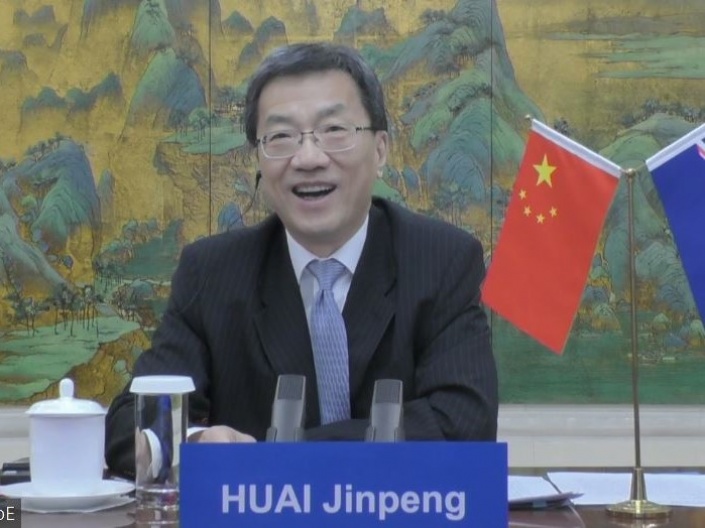
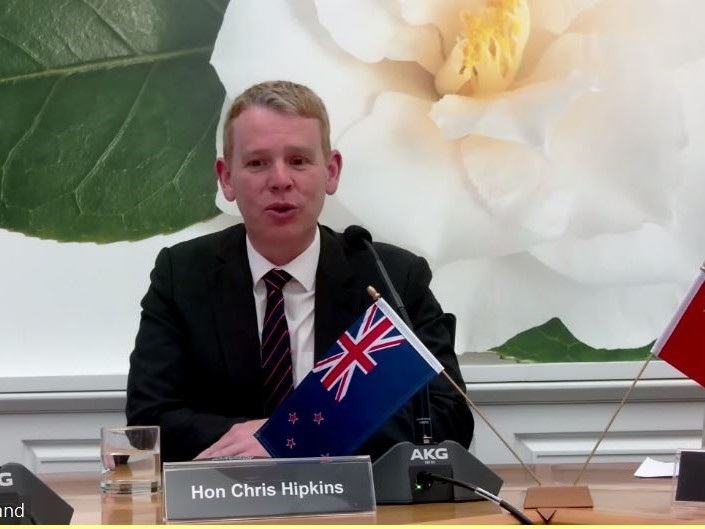
Jinpeng Huai, Minister of Education, People’s Republic of China and Hon Chris Hipkins, Minister of Education, New Zealand exchanged remarks at the Opening of the 10th Joint Working Group
The meeting saw the renewal of the Addendum to the New Zealand – China Arrangement on Cooperation in Education and Training, which covers a range of joint projects including the New Zealand-China Tripartite Partnership Programme. Note: the 2023 New Zealand-China Tripartite Fund is currently open for proposals from New Zealand university representatives.
Secretary for Education and Chief Executive, Ministry of Education of New Zealand, Iona Holsted and Vice Minister, Ministry of Education of People’s Republic of China, Xuejun Tian, renewed the Addendum to the New Zealand – China Arrangement on Cooperation in Education and Training.
The meeting also provided an opportunity for New Zealand representatives to provide updates on collaboration with China in the areas of Vocational Education, Higher Education, and Quality Assurance.
David Christiansen, ITP Transition Lead, Te Pūkenga, shared the newly-launched International Strategy and the development of international collaboration and opportunities internationally and in particular with China.
“We wish to renew and strengthen our existing offshore collaborations and create new collaborations. New Zealand has many areas of strength, across a range of industries, where we believe we can offer value and strength to Chinese Industry,” Mr Christiansen said.
There are currently 41 degree or diploma joint programmes across more than 14 subjects from engineering and fashion to viticulture and winemaking, and agriculture. These partnerships cover 20-plus provinces and numerous cities throughout China.
The fifth New Zealand China Higher Education Forum, co-hosted by Universities New Zealand and China Education Association for International Exchange was held virtually on 10 November 2022 and was a discussion topic for the JWG during the Higher Education discussion. Chris Whelan, Chief Executive of Universities New Zealand, was present at the fourth New Zealand-China Higher Education Forum held in Beijing in 2015. He told participants that, back then, “the focus was on how to deepen collaboration between our institutions, how to grow mutual student mobility, and how to ensure high-quality education offerings.” It is evident the New Zealand-China education relationship in the higher education sector has developed over the years to envelop broader current topics such as “green and sustainable development of higher education,” building on the foundation established through years of cooperation.
The final discussion topic, Quality Assurance, saw Alex Bidois from New Zealand Qualifications Authority (NZQA) provide an update on the progress of the working group on the Recognition of Distance Learning Qualifications between NZQA and the China Service Centre for Scholarly Exchange. The working group was established at the ninth Joint Working Group and NZQA has been working with its partner agency to lay a foundation to build towards mutual recognition of distance learning qualifications.
-
Joint initiative supports school group visits
To make the most of every opportunity to grow international education in schools across the country, Education New Zealand (ENZ) and the Schools International Business Association (SIEBA) have established a ‘clearing house’ for school student group visits.
There is increasing interest from such groups in visiting New Zealand, particularly from Japan, China, Thailand and Korea. Schools aren’t always able to accommodate these visits however, so ENZ and SIEBA are working together to channel the enquiries through a clearing house that aims to say ‘yes’, as a starting point, to any request. The clearing house then works behind the scenes with its members to identify schools that are keen (and have the capacity) to host, determine appropriate pricing for the visit, and ultimately improve the experience of, and bring efficiencies to, group visits to New Zealand.
ENZ is promoting the SIEBA clearing house service to its in-market networks, including agents and schools who are considering New Zealand as a destination for school group visits.
The service is another ‘value add’ by SIEBA and is free to its members. If you are a school (irrespective of whether or not you are a SIEBA member) that receives requests to host a group but is unable to, ENZ asks that you forward the request on to SIEBA. For more information on the clearing house please contact groups@sieba.nz
In the 17 February issue of E-News, we let you know about the Ministry of Education’s new online form for state and state-integrated schools to make it easier to register visiting groups of international students. Find out more about this here.
-
Alumni news - launch the New Zealand Educated LinkedIn group
We encourage you to look at this and refer the LinkedIn group to your own alumni and ask them to join up.
This is the first stage in our work with alumni. Once there are more members in the group we will start sending out notice of events, encourage alumni to form groups and start discussion forums.
Here is a comment from one of the alumni who recently joined: “Thank you very much for invitation, this group would make me feel like return back to NZ. Keep in touch.”
-
Huge response to Indonesia promotion
Prime Minister John Key and Education New Zealand Chief Executive, Grant McPherson, recently visited Indonesia. One of the highlights of the trip was a Jawa Pos event in Surabaya involving 2,500 students and 500 teachers to promote a competition to win a trip to New Zealand.
Jawa Pos is the largest newspaper group in Indonesia with over 500,000 copies circulated daily. Zetizen is Jawa Pos’ new news portal targeted at young people aged between 12-23 years old.Jawa Pos wanted to generate a buzz around the launch of their new platform. After consulting with NZ Inc. in Indonesia it was decided that a competition to win a trip to New Zealand would be the perfect hook to grab young people’s attention.
The tagline of the competition is: be a good Zetizen and go to New Zealand. Young people are being tasked with taking a positive action in their community and writing a short essay about why they should be chosen to come to New Zealand.
Jawa Pos has been profiling New Zealand and New Zealand educational institutions since the competition launched in May. The newspaper group will fly 34 young Indonesians to New Zealand in November for the trip of a lifetime – all captured and documented by a group of journalists who will be accompanying them.
Education New Zealand, New Zealand Trade and Enterprise and the Ministry of Foreign Affairs and Trade are putting together a fantastic programme. The group will visit schools and tertiary institutions in Auckland, Rotorua and Wellington. They will also get the chance to sample the wonderful tourist activities and fantastic food New Zealand has to offer.This competition is giving New Zealand fantastic profile and reaching a very targeted age group. These young people may very well go on to study in New Zealand.
-
Industry leaders gather for SIEBA hui
In 2016, international student enrolment numbers were 131,609. Of these, approximately 19,000 were enrolled in the New Zealand school sector: 16,390 at secondary level and 2,912 at primary. These numbers are expected to increase with a 16% growth in the primary school sector and 6% growth in secondary.
ENZ Chief Executive Grant McPherson said the hui was a great chance to connect with the school sector, and to update attendees about what’s happening in the wider industry.
“We appreciate the hard work you’re doing on behalf of students. You’re making an important contribution not just to your organisation but also to your region and New Zealand.”
The economic value of New Zealand’s international education industry in 2016 was estimated to be $4.5 billion. The schools sector is valued at $752 million, with $142 million coming from primary schools.
“Of course, it’s not all about economic value – we also know that international students bring cultural diversity and other wider benefits to our communities, classrooms and regions,” said Grant.
The hui was also an opportunity to celebrate leadership in the school sector through SIEBA’s inaugural leadership awards. Five awards were presented and ENZ would like to congratulate and thank those recipients.
 Diana Murdoch – Garin College
Diana Murdoch – Garin CollegeDiana has more than 20 years’ experience in international education working in the tertiary and school sectors. She has led the delivery of international business services to schools through her own company and has been a role model for innovation and thinking ‘outside the box’. She has presented at conferences, led workshops and mentored new directors. She remains enthusiastic and passionate about international education and continues to become involved in projects to support growth whenever she can. Diana is the SIEBA liaison for her region.
Kim Harase – Academic Colleges Group
Kim has a rich history of 33 years in international education in the UK, Australia and New Zealand. In 1999, as Associate Principal & Director of Marketing she led international marketing for a group schools. From 2006, she has focused solely on international marketing, sales and business development. Kim is a regular presenter at conferences, is a member of ATEED’s Futures Group and was a member of ENZ’s School Sector Reference Group. Kim has been a valuable resource for the school sector for many years.
 Lee Simeon – Pillans Point School
Lee Simeon – Pillans Point SchoolLee has been an international director for the past 8 years and is passionate about international student welfare and creating a family-like environment within the international community at her school. Lee has played a lead role in helping numerous other schools to gain signatory status and is seen as a key resource for other schools going through the application process. In 2016, Lee represented primary schools as a co-author of the school sector Code guidelines and is the SIEBA liaison for her region.
Anne Marie Biggs – Glendowie Primary School
Anne Marie is the Principal of Glendowie Primary since 1995. As well as a string of education firsts to her school’s credit, Anne Marie has built international student numbers to more than 50. The school serves as a model of success for the primary school sector and Anne Marie is the first to offer guidance and share with colleagues and other schools. She has partnered with ENZ on growth projects, is a member of Study Auckland and served as a member of the SIEBA Establishment Board.
 Denise Berry – Pakuranga College
Denise Berry – Pakuranga CollegeDenise is Director of International at a leading Auckland high school. She has been a key member of her cluster group since 1996. She has been a mentor for many schools and directors new to international education. She was a leading author of the Code and Guidelines 2010, and also a co-author of the School sector guidelines 2016. Denise has a wealth of knowledge and has become one of the school sector’s go-to people for support and advice.
-
Physically distant, digitally connected
Since early March, the team’s strategy for student-facing content has prioritised three areas: keeping students updated with official information about COVID-19 in New Zealand, supporting their wellbeing, and keeping New Zealand top of mind for prospective students, so we are well-positioned to recruit new students when borders reopen.
Our main focus is on supporting and connecting with international students within New Zealand, and helping them connect with each other.
The campaign takes a three-pronged approach to this through:
- Growing our audience on NauMai NZ through a digital advertising campaign so that we can offer more students information and support to enhance their experience. The ‘Stay well, stay connected’ page on NauMai NZ is a main landing page for website traffic coming through the campaign.
- Connecting students through our International Student Support Facebook Group. We have transitioned the ‘Ask New Anything’ Facebook group into the ‘International Student Support Group (NZ).’ This private group is a space for international students in New Zealand to connect with one another, ask questions, find help and offer advice. The group currently has 2,300 members including 475 new member who have joined in the past two weeks.
- Concentrating on content created by students, for students. We are predominantly using content made by students on our channels to present their own authentic experiences, through blog and video content and weekly Instagram live Q&A sessions.
Check out our YouTube playlist ‘International students in lockdown in New Zealand because of COVID-19'. As we move out of lockdown and into Alert Level 2, we will continue to support students with relevant content.
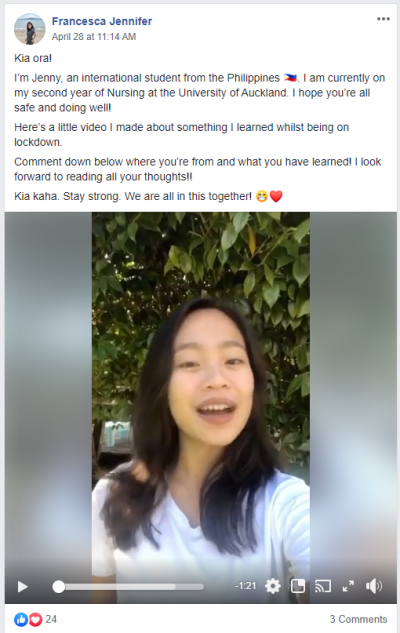
China channels
To ensure we’re reaching our Chinese students on the channels that they use, we are running a Chinese version of the campaign specifically for this audience. We are doing this by:
- WeChat advertising within New Zealand
- A Chinese language version of the NauMai NZ COVID-19 page
- Chinese language videos with information about work and financial support, studying onlineand living in a student hostel during lockdown.
- We are developing a new NauMai NZ ‘mini programme’ to deliver the NauMai NZ experience within WeChat. Work has already started, and we aim to launch the programme by the end of the year.
New content
Keep an eye out for new content across our platforms and social media channels, including NauMai NZ, Study in New Zealand, our Facebook page, Instagram, YouTube, WeChat and Weibo.
As you can see, there is a lot happening in the student content space at ENZ. We are working hard to ensure much needed information and support is provided to the many international students who are still in the country, as well as continuing to engage with the prospective students in our database and across our social media channels.
-
New Zealand Dubai Expo Pavilion inspires international workshop in Whanganui
Ten students from five different regions of Italy travelled with their teachers under the leadership of Dr Alberta Pettoello of the Italian Ministry of Education to join another 40 local high school students. In a three-day workshop they worked together, shared concerns and experiences, and learnt from each other how to communicate their messages across different cultures, realities, and languages.
The Italian Ministry of Education proposed the workshop after Lorenzo Micheli, the coordinator of its Digital Exchange Programme, visited the New Zealand pavilion at the Dubai Expo. He was inspired by the pavilion’s focus on New Zealand’s relationship with nature and indigenous Māori principles such as kaitiakitanga. The Whanganui River and Te Awa Tupua settlement that gave the river its own legal identity, with the rights, duties and liabilities of a legal person, was of particular interest.
Education New Zealand Manapou ki te Ao liaised with the Italian Ministry of Education and facilitated an introduction to local development agency, Whanganui and Partners, who coordinated with Ngā Tāngata Tiaki and local schools, and also supported the trip by funding the activities and workshop in Whanganui.
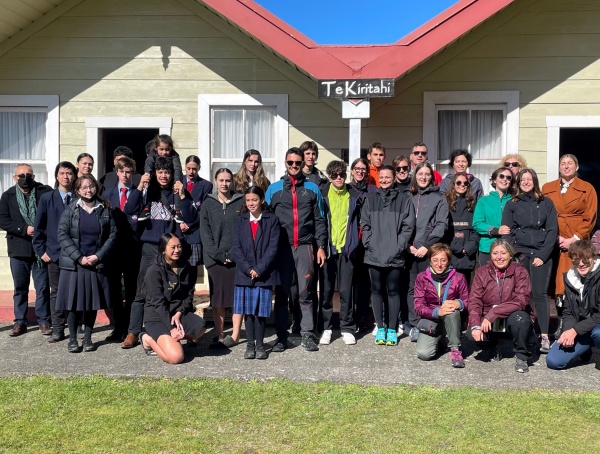
A highlight of the first day was the pōwhiri for the group at Kaiwhaiki Marae. For the Italian students and their teachers, this was their first introduction to Whanganui and Te Awa Tupua.
On arrival in Whanganui the group was welcomed by Ngā Tāngata Tiaki by powhiri at Kaiwhaiki Marae.
The topic of the workshop was “Humans as Nature”, in which the students were challenged to explore and develop “Rights for Nature”. The students were guided by Ngā Tāngata Tiaki trustee Tamahaia Skinner, who helped them start to define their rivers’ values and characteristics.
The Italian students brought an international perspective to the discussion by introducing their rivers and the challenges they face, encompassing the Ticino river, the Strona river, the Piave river, the Chienti river and the Sinni river.
Students were divided into five teams of 10, with two Italian students assigned to each group. What followed was a hive of discussion, activity and collaboration as each group developed presentations proposing strategies and activities necessary to implement the conservation and care of rivers, and most importantly give the rivers a voice.
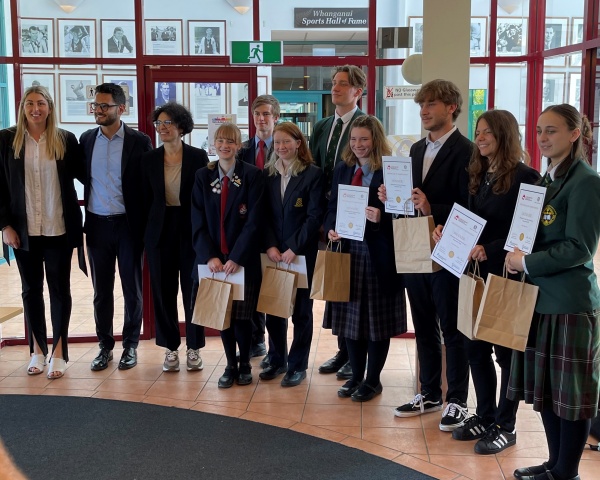
And the winners are….. Team Chienti/Whanganui won the overall team competition! Also pictured from left are: Hannah Middleton, Chief Executive of Whanganui and Partners; Lorenzo Micheli, coordinator of the Digital Exchange Programme for the Italian Ministry of Education, and Dr Alberta Pettoello of the Italian Ministry of Education who lead the delegation of students and teachers to New Zealand.
At the conclusion of the workshop the overall winner was the Chienti/Whanganui team. Strona/Whanganui were judged the most inclusive team; Sinni/Whanganui the best presented team; Ticino/Whanganui the best team spirit; and Piave/Whanganui the most creative team.
The organisation and thoughtfulness that went into the preparation and coordination of the workshop was first class. But it was the joy of the students who found new friends on the other side of the world, exchanging Instagram and FB accounts while sharing a wonderful week of discovery, that shone through as the workshop’s greatest outcome. It was this companionship and mindfulness of other lives and cultures that prompted the final defining group hug.
The week changed everyone involved, transforming perspectives and expectations of others. I’m sure they will meet up again as their travels as global citizens continue.
- Justin Barnett, Director Communications at Education New Zealand Manapou ki te Ao
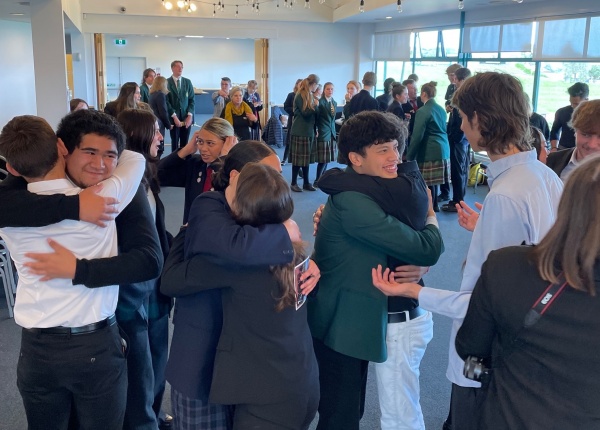
It was hugs all around at the completion of a three-day hackathon and workshop amongst Italian and New Zealand high school students. An uplifting outcome of the workshop was the strong bond that developed between the students as they learnt about each other while sharing cultures and experiences.
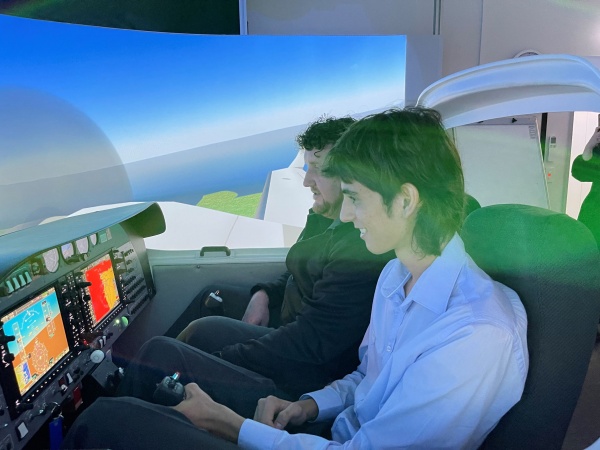
Filippo Chiodini from the Daniel Crespi school in Varese (in front) follows the instructor’s guidance as he manoeuvres his virtual plane from the cockpit simulator at the New Zealand International Commercial Pilot Academy in Whanganui.
-
Help us thank New Zealand’s education partners in Japan
As part of a programme to explore greater opportunities for the New Zealand education industry in Japan.
The alumni networking function will acknowledge and show our appreciation for the informal “ambassadorial” role alumni undertake on behalf of New Zealand education. We will also be encouraging alumni to join the recently launched New Zealand Educated Alumni LinkedIn group where they will be able to network with fellow alumni and keep in touch with events and activities of interest.
The agent seminars will recognise the work agents do on behalf of New Zealand education and show the agents our appreciation. The seminars will also inform agents of any immigration updates and changes (there will be someone from Immigration New Zealand in attendance) and let them know about the agent e-learning that will be launched in the next few months. A preview of this will be available at the event.
It is hoped that these activities will further nignite agents’ interest in, and enthusiasm for, promoting New Zealand as an education destination.
To ensure we reach the greatest number of agents and alumni, we would like your suggestions for who you would like us to invite.
For the dates for each event, and a form where you can enter the names and contact information of those you’d like to be sent an invitation, click here.
In completing this form, you will be assured of early notification of when registration opens for these events.
As well agents and alumni, we know that many New Zealand education institutions have active and fruitful partnerships with fellow institutions in Japan. We are hoping to host such people at a ‘thank you’ lunch where we can show our gratitude for the very important role they play in fostering a lively education exchange between our two countries. Details about the lunch will be provided at a later date.
These events are a great opportunity for you to show how much you value your education partners and advocates in Japan.
Thank you in advance for help make these events the best they can be.

